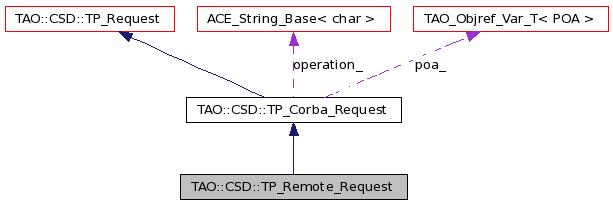Represents a "queue-able", remote, CORBA request. Both syncronous and asynchronous remote CORBA requests are represented by the class. More...
#include <CSD_TP_Remote_Request.h>


Public Member Functions | |
| TP_Remote_Request (TAO_ServerRequest &server_request, const PortableServer::ObjectId &object_id, PortableServer::POA_ptr poa, const char *operation, PortableServer::Servant servant, TP_Servant_State *servant_state) | |
| Constructor. | |
| virtual | ~TP_Remote_Request () |
| Virtual Destructor. | |
Protected Member Functions | |
| virtual void | prepare_for_queue_i () |
| virtual void | dispatch_i () |
| Dispatch the request to the servant. | |
| virtual void | cancel_i () |
| Cancel the request. | |
Represents a "queue-able", remote, CORBA request. Both syncronous and asynchronous remote CORBA requests are represented by the class.
TBD - Go over the following comments and clean up.
Since this class derives from the TP_Request class, it can be added to a TP_Queue (ie, it is a "queueable" request). It represents a servant request that has been made by a remote CORBA client (as opposed to a collocated CORBA client). The term "CORBA client" is being used here to distinguish CORBA servant requests (those made thru a CORBA object reference), and "Custom" servant requests that can be "dispatched" to the strategy directly by the client application code (ie, not thru a CORBA object reference). Thus, there are "CORBA clients" and "Direct clients".
In summary, this class represents a servant request made when a remote client invokes a method on a CORBA object reference.
Definition at line 61 of file CSD_TP_Remote_Request.h.
| TAO::CSD::TP_Remote_Request::TP_Remote_Request | ( | TAO_ServerRequest & | server_request, | |
| const PortableServer::ObjectId & | object_id, | |||
| PortableServer::POA_ptr | poa, | |||
| const char * | operation, | |||
| PortableServer::Servant | servant, | |||
| TP_Servant_State * | servant_state | |||
| ) |
Constructor.
Definition at line 9 of file CSD_TP_Remote_Request.inl.
: TP_Corba_Request(object_id, poa, operation, servant, servant_state, server_request) { }
| TAO::CSD::TP_Remote_Request::~TP_Remote_Request | ( | ) | [virtual] |
| void TAO::CSD::TP_Remote_Request::cancel_i | ( | ) | [protected, virtual] |
Cancel the request.
Implements TAO::CSD::TP_Request.
Definition at line 50 of file CSD_TP_Remote_Request.cpp.
{
this->do_cancel();
}
| void TAO::CSD::TP_Remote_Request::dispatch_i | ( | ) | [protected, virtual] |
Dispatch the request to the servant.
Implements TAO::CSD::TP_Request.
Definition at line 28 of file CSD_TP_Remote_Request.cpp.
{
try
{
this->do_dispatch();
}
catch (const ::CORBA::Exception&)
{
// Eat these. We probably should log these, but since we have already
// unblocked the requesting thread there is no point in saving it or
// doing anything with it.
}
catch (...)
{
// Eat these. We probably should log these, but since we have already
// unblocked the requesting thread there is no point in saving it or
// doing anything with it.
}
}
| void TAO::CSD::TP_Remote_Request::prepare_for_queue_i | ( | ) | [protected, virtual] |
Prepare this TP_Remote_Request object to be placed into the request queue. This will cause the underlying TAO_ServerRequest object to be cloned.
Reimplemented from TAO::CSD::TP_Request.
Definition at line 21 of file CSD_TP_Remote_Request.cpp.
{
this->do_clone();
}
 1.7.0
1.7.0